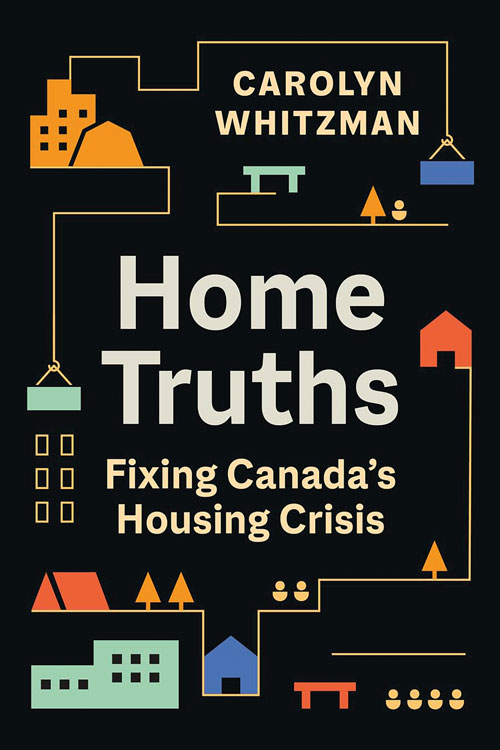As rents continue to rise in Alberta, a lack of non-market housing, or housing not subject to investor speculation, is exacerbating the challenges experienced by lower-income folks, many of whom increasingly spend most of their wages in rent or take additional jobs to make ends meet. But our province is not alone. Much of Canada is facing a housing affordability crisis, driven in no small part by our country’s underwhelming (less than 1 per cent of GDP) investment in public, community and co-operative housing. This crisis—and how to address it—is at the core of Carolyn Whitzman’s latest book, Home Truths: Fixing Canada’s Housing Crisis.
As a housing policy researcher, Whitzman has undertaken work for the Office of the Federal Housing Advocate and the Canada Mortgage and Housing Corporation and helped establish the Housing Assessment Resources Tools (HART) project at the University of British Columbia. Leveraging this expertise, Whitzman explains how three decades of neoliberal policies have led to tensions between homeowners, housing investors and the rest of us. Since the 1990s Canada has followed the lead of the US and Britain and transformed housing into a vehicle for wealth accumulation, writes Whitzman, leaving tenants at a disadvantage. “Speculation [in housing] benefits a lot of people who invest, but it harms those who are most vulnerable, and increases wealth disparities.”
Alberta has a homeownership rate of roughly 71 per cent, the third-highest in Canada, and the province epitomizes both the successes and the failures of government policies on housing. Our province has minimal rent controls, for instance, which makes it ripe with opportunity for landlords who once a year can hike rents as high as the market will bear. What we need, writes Whitzman, is a “rights-based housing system [that] would protect renters from evictions, and give renters the same rights as owners.”
As well, to protect homeowners from the so-called nuisances created by renters, or from the “social disorder” fostered by allowing a variety of uses in a residential neighbourhood, zoning bylaws across Alberta continue to favour low-density, single-use development. Even minor changes to the status quo face fierce opposition—a problem not unique to Alberta, writes Whitzman: “The acceptance of third-party rights—the right of neighbours to object to nearby development—is a distinctive and harmful feature of Anglosphere planning, which prioritizes property ownership over the right to housing.”
Alberta has moved towards changing this, notes Whitzman, citing Edmonton’s equity-based zoning bylaw and Calgary’s non-market land disposition policy.
While similar progress is happening across Canada, these efforts are unlikely to succeed at scale without significant investment in homes that low- and moderate-income households can afford to rent, in the right locations. Drawing from the success of strategies implemented in France, Finland and Germany—all of which spend more than 1 per cent of their GDP on non-market housing—Whitzman suggests a path forward. “We should be relying on progressive wealth and income taxes to redress huge inequalities,” she notes, pointing to the inadequacy of property taxes to subsidize non-market housing. “After three decades of virtually no investment in housing infrastructure, a baseline of 1.5 per cent of Canada’s GDP might realize the right to housing.”
Ultimately, the issue isn’t a lack of ideas, or even funding. To solve Canada’s housing crisis, Whitzman argues, political pressure is essential to spur governments into coordinated, meaningful action. “All levels of government can make better, evidence-based housing decisions—if voters demand it.”
Ximena González is a writer and editor in Calgary.
_______________________________________


